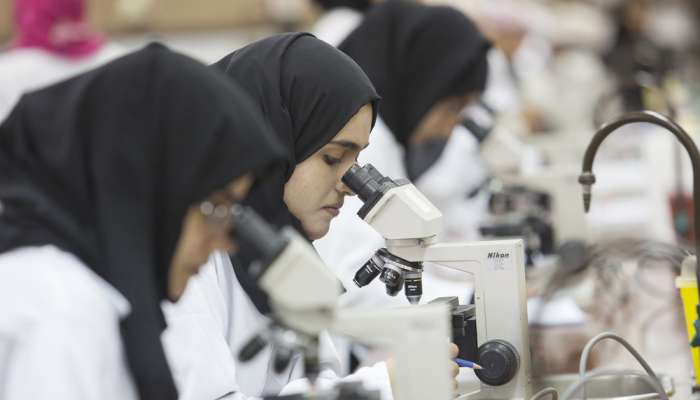
Muscat: The Sultanate of Oman is making dedicated efforts to support research and innovation, which has resulted in its advancement by 10 positions in the Global Innovation Index (GII) issued by the World Intellectual Property Organization (WIPO) over four years—rising from 84th to 74th place.
Additionally, Oman improved its ranking in innovation outputs by 23 spots, moving from 109th to 86th.
In this context, Dr. Saif Abdullah Al Haddabi, Undersecretary for Research and Innovation at the Ministry of Higher Education, Research, and Innovation, affirmed to Oman News Agency (ONA) that the recent commendation by the World Bank for "Oman Vision 2040"—which places significant emphasis on human capital development, education quality enhancement, and fostering a culture of research and innovation—reflects the concerted efforts of all relevant stakeholders working diligently to achieve the vision’s goals.
He stated that Oman, under "Oman Vision 2040," aims to rank among the top 40 countries in the Global Innovation Index by 2030 and among the top 20 by 2040.
He explained that the innovation index is one of the most critical indicators in "Oman Vision 2040," as it influences competitiveness and other key metrics. The index is measured by WIPO, drawing data from the World Bank, UNESCO, and 13 other global institutions.
At the national level, he noted, the index is measured through infrastructure and digital framework programs. This includes research centers such as the Muscat Innovation Complex as an established infrastructure, as well as Oman Research and Education Network (OMREN), which covers nearly 99% of institutions and connects all universities and colleges in Oman, offering over 23 services.
He highlighted the development of digital infrastructure through Oman Research Portal, an integrated digital platform managing research programs—evaluating, funding, and tracking their performance.
Additionally, efforts are underway to establish a research equipment platform cataloging and classifying research tools used by academics, industrial institutions, and other stakeholders.
Al Haddabi added that the Ministry of Higher Education, Research, and Innovation implements numerous programs supporting scientific research in Oman, categorized into three main initiatives targeting academic, governmental, and industrial sectors.
The Scientific Publishing Program, he noted, serves as an international benchmark for knowledge production, tracking publications in prestigious scientific journals.
This programme enhances Oman’s standing in the Global Innovation Index’s knowledge output metrics.
Since 2018, the Ministry has funded 2,228 research projects under the Academic Sector Research Support Program ("Performance-Based Institutional Funding"), including 475 projects last year worth approximately OMR2.4 million.
Under the Strategic Research Programme for the government sector, addressing institutional challenges, 74 projects were funded, while the Industrial Sector’s "Ijada" Program supported 61 projects with a total investment of OMR2.5 million.
Al Haddabi emphasised that these integrated programmes, initiatives, and funding mechanisms collectively advance "Oman Vision 2040" objectives, elevate Oman’s global rankings, and enhance the efficiency of national research and innovation.
As for innovation and capacity-building programmes, he outlined 13 initiatives, including the National Program for Supporting Innovation Centres in Higher Education, the Student Graduation Projects to Startups Program, the Falling Walls Competition, and national research awards honouring scholars across sectors.
Omani innovators and researchers also participate in international competitions such as the Geneva International Exhibition of Inventions, the Kuala Lumpur International Invention Awards, and the Lindau Nobel Laureate Meetings.
He touched on the four pillars of the National Innovation Strategy, namely Knowledge-Based Economic Diversification (Transforming traditional products into high-value outputs using technology and knowledge), Human Capital (Investing in education, skills, and cognitive development to foster innovative solutions), Institutional Integration (Strengthening collaboration among government, academic, and industrial entities to address national challenges) and Intellectual Property (IP) (Protecting innovators’ rights and patents to ensure long-term investment in innovation, where IP assets like patents are key intangible resources for licensing or commercialization).
On future plans, he stated that the Ministry is implementing structured strategies to support academic innovation through establishment and empowerment pathways, including six university incubators. Programs are designed to be flexible and scalable for maximum researcher and innovator benefit.
Upcoming initiatives include launching "Oman Innovates," a national platform centralizing innovation services—facilitating access to support, registration, funding, and investor connections—to serve as Oman’s digital innovation hub.
In conclusion, Al Haddabi underscored the media’s vital role in promoting scientific and innovation culture, which is fundamental to nurturing a generation of innovators and entrepreneurs. He observed growing awareness in schools and universities through competitions and events, reflecting the nation’s progressive strides in research and innovation.